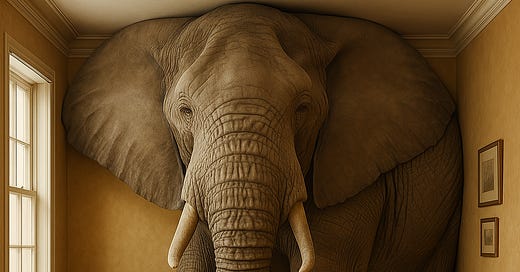A plumber once set up a sole trading business. He was very good at identifying faults in plumbing systems and solving a wide range of problems for his clients.
He drove around the city in his van, completing five to six jobs a day, aiming to provide excellent service by diagnosing various plumbing-related issues. The business name was Fault Finding Plumber.
The plumber was skilled at his trade, but whenever he went to a new client's house, he would complain about the previous client's poor maintenance of their plumbing system. Despite his talent, he kept wondering why his business wasn’t growing into what he had dreamed of—a team of plumbers under his leadership, with a fleet of vans resolving the city's plumbing issues efficiently and gaining loyal, repeat clients.
The plumber was unaware of the “elephant in the room”.
Everyone around him could visibly see the elephant, except for himself.
One day, he was called to a client’s house. As he parked his van in the driveway, he realized it was his first repeat client. Sitting in the van, he thought to himself how arrogant this client was—always trying to show him how to do his job and acting as if they knew everything.
Still, the plumber entered the house, listened to the client, and identified the plumbing fault. He kept his thoughts to himself, having decided before going in that saying anything might cause unnecessary friction. He completed the job quickly and, as he was leaving, the client said, “See you next time.”
On the drive home—stuck in traffic—he found himself thinking. For the first time, he had a repeat client. And not only that, but the client had also invited him back. He reflected on what was different this time.
It finally struck him: this time, he hadn’t shared any complaints about his previous clients.
He saw the “elephant in his mind”.
In that moment, his ego shattered. The elephant no longer weighed him down—it felt as though it floated on clouds.
He realized that he was very good at fault finding plumbing issues. But he lacked the self-awareness of finding faults in his own nature and mannerisms. These mannerisms were quietly hindering his business growth.
When the ego gets truly hurt it shatters in a moment.
Sometimes arrogance must break arrogance,
Sometimes ice can only be broken by ice,
Sometimes silence must meet silence,
And sometimes only a greater ego can shatter the one within, or the elephant in the mind.
He had finally fixed the only fault he’d never inspected—his own.
These moments of ego-dissolution are an important intersection of the crossroads in our life. When we truly identify how the ego develops and is actually limiting our own growth, it can propel us in our journey of self-awareness. We can either continue down the same road that our ego takes us, or we can take the crossroad to truly transform ourselves in what we truly want to become.





